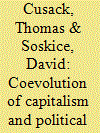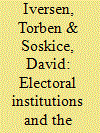|
|
|
Sort Order |
|
|
|
Items / Page
|
|
|
|
|
|
|
| Srl | Item |
| 1 |
ID:
097024


|
|
|
|
|
| Publication |
2010.
|
| Summary/Abstract |
Protocorporatist West European countries in which economic interests were collectively organized adopted PR in the first quarter of the twentieth century, whereas liberal countries in which economic interests were not collectively organized did not. Political parties, as Marcus Kreuzer points out, choose electoral systems. So how do economic interests translate into party political incentives to adopt electoral reform? We argue that parties in protocorporatist countries were "representative" of and closely linked to economic interests. As electoral competition in single member districts increased sharply up to World War I, great difficulties resulted for the representative parties whose leaders were seen as interest committed. They could not credibly compete for votes outside their interest without leadership changes or reductions in interest influence. Proportional representation offered an obvious solution, allowing parties to target their own voters and their organized interest to continue effective influence in the legislature. In each respect, the opposite was true of liberal countries. Data on party preferences strongly confirm this model. (Kreuzer's historical criticisms are largely incorrect, as shown in detail in the online supplementary Appendix.)
|
|
|
|
|
|
|
|
|
|
|
|
|
|
|
|
| 2 |
ID:
138424


|
|
|
|
|
| Summary/Abstract |
The knowledge economy, deindustrialization, and the decline of Fordism have undermined the economic complementarities that once existed between skilled and semiskilled workers. The result has everywhere been a decline in coordinated wage bargaining and unionization and a notable rise in labor market inequality. Yet, the political responses have been very different across advanced democracies. While labor markets for part-time and temporary employment have been deregulated across the board, some countries have compensated losers through increased cash transfers and active labor market programs and others have allowed inequality and insider-outsider divisions to grow deeper. The article argues that the divergent government responses reflect differences in underlying electoral coalitions, and that these in turn mirror the structure of party and electoral systems. The authors support their argument with evidence for government responses to economic shocks in the period 1980 to 2010.
|
|
|
|
|
|
|
|
|
|
|
|
|
|
|
|
| 3 |
ID:
088897


|
|
|
|
|
| Publication |
2009.
|
| Summary/Abstract |
The authors present an alternative to power resource theory as an approach to the study of distribution and redistribution. While they agree that partisanship and union power are important, they argue that both are endogenous to more fundamental differences in the organization of capitalist democracies. specifically, center-left governments result from pr consensus political systems (as opposed to majoritarian systems), while strong unions have their origins in coordinated (as opposed to liberal) capitalism. These differences in political representation and in the organization of production developed jointly in the early twentieth century and explain the cross-national pattern of distribution and redistribution. The clusters have their origins in two distinct political economic conditions in the second half of the nineteenth century: one in which locally coordinated economies were coupled with strong guild traditions and heavy investment in cospecific assets and one in which market-based economies were coupled with liberal states and more mobile assets.
|
|
|
|
|
|
|
|
|
|
|
|
|
|
|
|
| 4 |
ID:
073368


|
|
|
|
|
| Publication |
2006.
|
| Summary/Abstract |
Standard political economy models of redistribution, notably that of Meltzer and Richard (1981), fail to account for the remarkable variance in government redistribution across democracies. We develop a general model of redistribution that explains why some democratic governments are more prone to redistribute than others. We show that the electoral system plays a key role because it shapes the nature of political parties and the composition of governing coalitions, hence redistribution. Our argument implies (1) that center-left governments dominate under PR systems, whereas center-right governments dominate under majoritarian systems; and (2) that PR systems redistribute more than majoritarian systems. We test our argument on panel data for redistribution, government partisanship, and electoral system in advanced democracies.
|
|
|
|
|
|
|
|
|
|
|
|
|
|
|
|
| 5 |
ID:
100773


|
|
|
|
|
| Publication |
2010.
|
| Summary/Abstract |
A major puzzle in the open economy literature is why some countries have persistently higher real exchange rates than others. Even more puzzling is the fact that countries with high real exchange rates are strong export performers. We solve both puzzles with a model that integrates two central debates in the comparative political economy of advanced economies: one linking wage bargaining, incomes policy, and competitiveness, and the other linking partisanship, political institutions, and redistribution. We bring the two together by emphasizing the role of skill formation. We argue that union centralization is necessary for wage restraint and training on a large scale, but this in turn requires a political coalition that subsidizes such training. When both are present, wage restraint generates external competitiveness, whereas wage compression pushes up sheltered prices and hence the real exchange rate, and vice versa. We test the argument on data on export performance and real exchange rates.
|
|
|
|
|
|
|
|
|
|
|
|
|
|
|
|
|
|
|
|
|